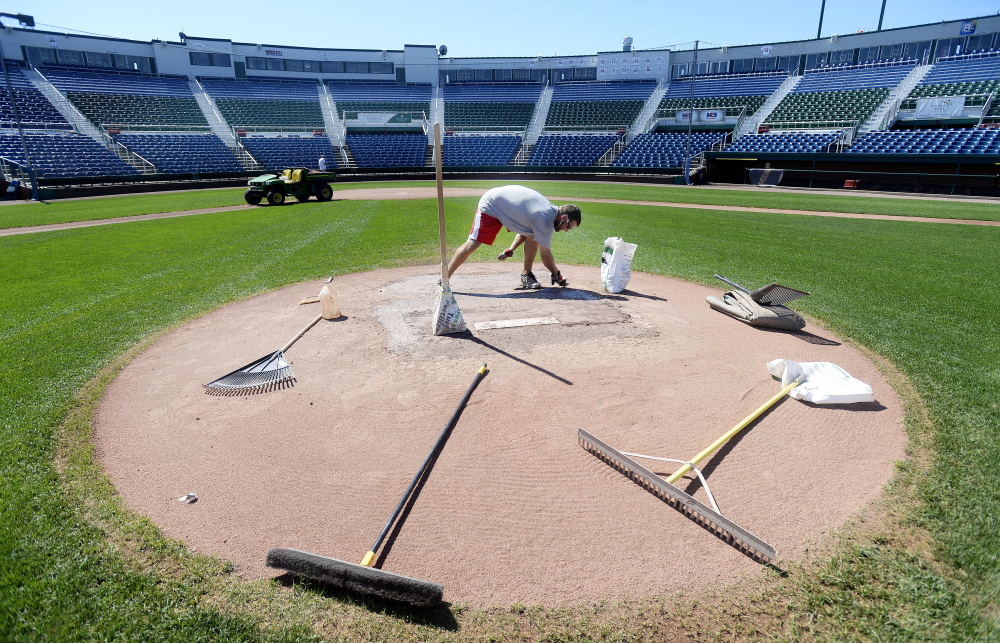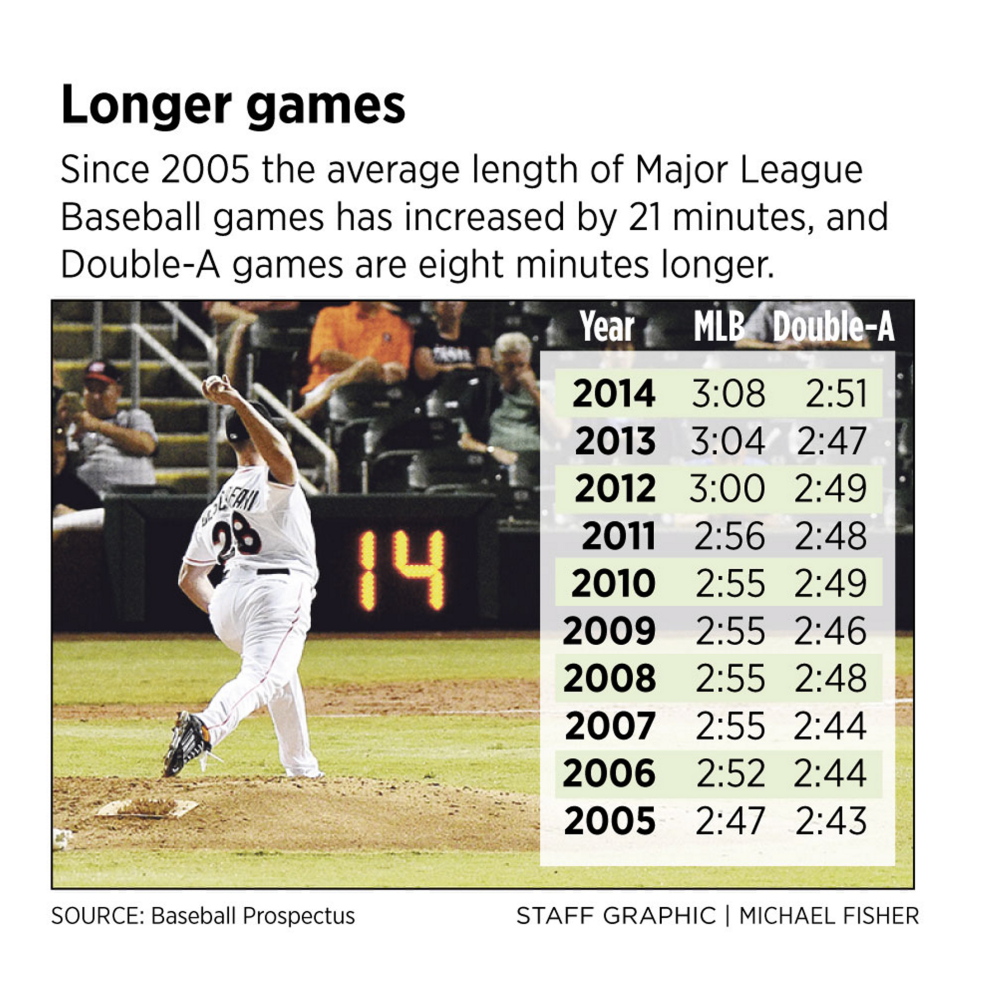Baseball is preparing to tinker with one of its most cherished traditions, by adding a pitch clock to minor league games.
“Baseball has always been the timeless game,” Portland Sea Dogs General Manager Geoff Iacuessa said in summing up the baseball purist’s philosophy.
Trying to rein in ever-lengthening games, the decision-makers in professional baseball appear to think it’s time for a change.
Starting this season, games in the top two levels of the minor leagues – Triple-A and Double-A – will feature a clock to limit how much time a pitcher takes between pitches. The number of seconds hasn’t been disclosed.
The Sea Dogs, a minor league affiliate of the Boston Red Sox, play at the Double-A level in the Eastern League. Iacuessa said Thursday he received an email from Minor League Baseball, the governing body for all minor league teams, announcing that a pitch clock will be used this season.
“It said someone will be in contact to install the clock,” Iacuessa said.
ALTERING TRADITION TO KEEP YOUNG FANS
The clock will be similar to the shot clock used in professional and college basketball, forcing a team to shoot the ball within a certain time.
In basketball, the clock is supposed to generate more offensive play. In baseball, a clock will be used to speed up the game.
The baseball clock also will be used to enforce time limits for pitching changes and breaks between innings.
“Baseball is not the fastest-moving game,” said Eastern League President Joe McEacharn. “It only slows down more when these artificial delays are put in place.
“Kids are a big part of our audience. Younger children have shorter attention spans. The more we can keep them engaged in the game, the more we can develop fans, present and future,” he said.
Sea Dogs catcher Matt Spring understands that need, but has doubts about the wisdom of messing with the game’s traditions.
“I have reservations about it because it takes away the purity of the game,” Spring said. “Baseball has never had a time limit. You play until a team makes 27 outs. That makes it so special.”
Two Sea Dogs fans agree.
“I like it the way it is,” said Sam Boothby, 74, a season-ticket holder from Gorham. “There are times the pitcher is a bit tardy. Other than that, the pace of the game is fine.”
Aiden Knowles, 15, of Cape Elizabeth, often is at Hadlock Field early to collect autographs, and then watch the game – every second of it. He doesn’t want to be rushed.
“I think a lot of baseball is the anticipation before the pitch,” Knowles said. “I don’t know (about a pitch clock). If the anticipation is not there, I don’t know if the game will be as good.”
CLOCK WOULD AFFECT THE HITTERS, TOO
The pitch clock was used last year in the Arizona Fall League, an out-of-season league where top minor leaguers can get more playing time. The league has been used for experimentation before – the 2013 season used instant replay, paving the way for the major leagues to implement it in the 2014 season.
The average time for 16 fall league games that used the clock was 2 hours, 42 minutes – 10 minutes shorter than games played the previous year.
According to Baseball Prospectus, the average Major League Baseball game last year took 3 hours, 8 minutes, an increase of 21 minutes from 2005. Another baseball website, Fangraphs, figured the average time between pitches in the majors is 23 seconds.
Although the major leagues will not be implementing a pitch clock in 2015, a successful rollout in the minors could lead to that.
Both McEacharn and Iacuessa are awaiting details about the pitch clock and other rules designed to speed up play. One rule calls for the hitter to keep at least one foot in the batter’s box – a rule that the Eastern League already has, but it isn’t always enforced.
The time limit between pitches used in the Arizona Fall League was 20 seconds. If a pitcher violated the rule, a ball was called.
Spring, the Sea Dogs catcher, doesn’t want strict enforcement of the rule.
“What’s going to happen when the bases are loaded and the pitcher’s trying to get out of a jam, and is trying to figure out the right pitch?” he said. “Now you’re telling him to work in the confines of a pitch clock? There is going to have to be a little bit of give and take.”
And as a batter, Spring does not want the pitcher working too quickly.
“If a pitcher is going quick, it’s more bothersome for me,” he said. “If I know a guy is trying to take his time, that’s giving me a little bit of an edge.”
A tweet by former Sea Dogs pitcher Caleb Clay points out why: “I like the pitch clock idea. Nothing I hate more than hitters taking 45 seconds in between every pitch.”
So both pitchers and batters will have to adjust to having limited time.
The guys in the front office will have to make adjustments, too.
“I’m all for crisper games,” Iacuessa said, still trying to accept the idea. “But baseball has always been the sport without a clock.”
Send questions/comments to the editors.





Success. Please wait for the page to reload. If the page does not reload within 5 seconds, please refresh the page.
Enter your email and password to access comments.
Hi, to comment on stories you must . This profile is in addition to your subscription and website login.
Already have a commenting profile? .
Invalid username/password.
Please check your email to confirm and complete your registration.
Only subscribers are eligible to post comments. Please subscribe or login first for digital access. Here’s why.
Use the form below to reset your password. When you've submitted your account email, we will send an email with a reset code.